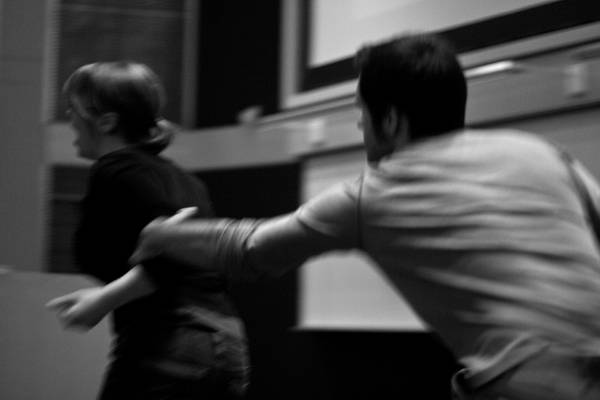Catalyst Theater educates students on sexual assault

Cailan Sockness, senior in psychology and Lindsay Allen, senior in performing arts argue in a skit about domestic violence presented by the Catalyst Theater Company Saturday August 22, 2009 in Hoover Hall. Photo: Rashah McChesney/Iowa State Daily
August 23, 2009
It’s the last weekend of summer and in the cool of Hoover Hall, amid the chatter of students filing into the lecture hall, The Catalyst Theater Company, a group of five women and two men, are preparing to educate freshman about sexual violence.
Jeritt Tucker, senior in psychology, fiddles with two green and white rubber bracelets on his arm as he chats with the rest of the cast before the show.
“When I first started, I couldn’t get into character at all,” said Tucker, who plays the role of “Ross,” an acquaintance-rapist in the first scene the group does.
The scene involves a freshman girl who goes to a party after being invited by Tucker’s character, who then encourages her to keep drinking until she goes upstairs with him to “lie down.” At this point, the skit ends and all involved stand in front of the audience, encouraging members to ask questions about what really happened.
“What really happened that night, Ross?” shouted Christian Engebretson, sophomore in animal science.
“I got some,” Tucker’s character replied.
“What happened that night, Melissa?” shouted an audience member to the girl who was taken upstairs.
“I don’t really know,” said Stephanie Collier, junior in child, adult and family services who plays “Melissa” in the first scene. “I remember playing beer pong, and then we went upstairs so I could lie down and he was kissing me. He kept trying to kiss me, I don’t really remember, but I woke up alone in his room this morning with no clothes on.”
Members of the audience find out that Melissa’s friends weren’t sure how to handle the situation and were having their own fun. They didn’t want to make a scene, whereas Ross’ friend didn’t want to block Ross’ encounter.
This type of audience participation is skill-building, said Ray Rodriguez, coordinator for the group and health promotion coordinator at the Thielen Student Health Center. It eliminates the observer role and forces participation, which is what the group hopes will happen when students are confronted with these types of situations outside of the classroom.
“These aren’t farfetched scenarios” Rodriguez said. “Whether or not it’s someone’s first time or ten-thousandth time, no one deserves to have their body used in a way they’re not comfortable with.”
The group, formed with a grant from the Department of Justice, uses student-written scripts to connect with and educate their audiences about situations that lead to sexual assault, violence and abuse in the college setting, Rodriguez said.
Other scenes devote time to stalking and domestic violence.
During the domestic-violence scene, Cailan Sockness, senior in psychology, plays the angry boyfriend of Lindsay Allen, senior in performing arts. Their interplay escalates to physical violence quickly, and Allen’s screams evoke shocked and uncomfortable faces from some audience members.
Before the show Rodriguez tells the audience that uncomfortable situations will be portrayed and offered the counseling of advocates from ACCESS, an assault care center in Ames, who attend each showing.
Sockness and Tucker sit down at one point during the show and talk about what it’s like to be a man confronted with a society who recognizes men as aggressors and rarely as victims.
Rodriguez said the group focuses on violence and sexual assault against women because statistics show they are targeted more often. However, he said, that does not discount the fact that men can be the target of sexual violence, just as violence happens in same-sex relationships.
Tucker said the role he plays in the show is an uncomfortable one.
“I just kind of have to shake it off,” he said. “Just thinking about that mentality and how the women feels, that hits me really hard.”
After the show, when Tucker goes to parties he can tell who has seen the show and who hasn’t, he said. Usually they avoid him, and while he doesn’t think it’s necessarily because they associate him with his character, he thinks it has a lot to do with the uncomfortable nature of the topic he portrays.
“It’s really hard for me to enjoy a party now,” he said. “I’m always watching, like ‘that guy looks a little iffy.’”
Tucker said men are also victimized as well because they are expected to play certain roles that can lead to situations of sexual assault.
Rodriguez, who was involved with the show in 2008 but took over as coordinator until 2009, said it’s hard for some cast members to drop the issues at the end of the day and some have been affected by violence in the past.
“One more day, two more shows, everyone doing all right?” Rodriguez said to the group as they file out of the auditorium and head out for dinner.






